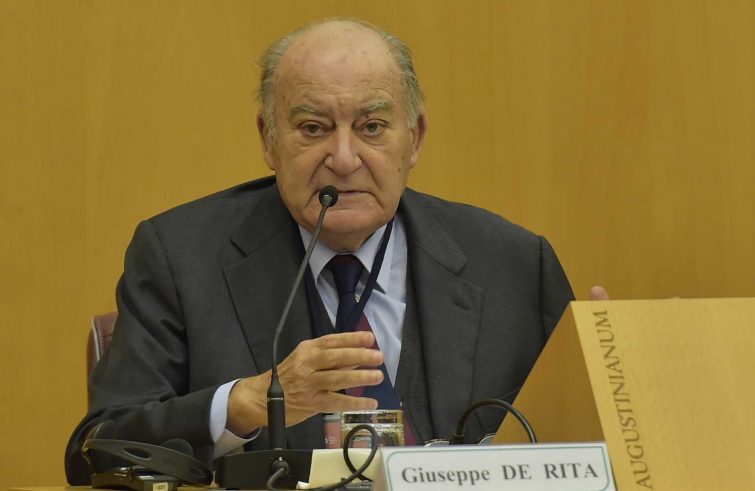
“The greatest risk for us all is to fall into lethargy.” On the eve of The Economy of Francesco Giuseppe De Rita, chairman of CENSIS – Centre for Social Studies and Policies- warns against a notion of socio-economic and political development that fails to acknowledge “discontinuity.” Based on his 70-year long experience as expert observer of social dynamics, he explained to SIR why ” intermediate bodies” must regain vigour to ensure a true change of course: “There can be no development without dialectics: if we all stand still and wait for a bonus, no progress will be made. We need to understand that development stems from a dialectics involving many players, and not a single one.”
The crisis caused by the pandemic led the current socio-political landscape to experience a discontinuity with respect to the past. How would you describe it?
Development is never evenly balanced, as shown in the theories of the 1950s, 1960s and 1970s. It is a discontinuous process. It never implies moving together towards a marvellous goal. If we fail to accept this, we will remain entrapped in our innate goodness that is certainly a noble sentiment to be pursued, but when it evolves into do-goodism it becomes unrealistic. In my opinion, the Church runs this risk, namely, to yield to a theory of “gradualist” development when speaking of climate, development, circular economy. These are all beautiful things, but they collide with a history marked by periods of discontinuity. This is precisely the period we are living today, which, in terms of development, raises major challenges that we are unable to respond to. Suffice it to note that Italian people responded to the COVID-19 epidemic with the remnants of a bygone culture, with a bonus for everyone.
Unless we accept that development is a continuous set of unbalances, we will be locked in the first imbalance we are hit by, followed by a second imbalance, by a third, and so forth.
“We are all in the same boat, no one is saved alone”, the Pope said on various occasions. Is Italy, Europe and the rest of the world capable to perceive this message in your opinion? Or is individualism doomed to prevail once again?
After seventy years dedicated to studying the fundamental mechanisms of social culture, I learned that development does not occur through one person alone, but through many societal players: the State, the business world, trade unions and intermediate bodies. For far too long we believed, including myself, that the State was the main agent of development. Over the decades I came to understand that development is accomplished by many players, and that all these players bring about conflicting results. This struggle eventually leads to what we refer to as development.
There can be no development without dialectics: if we all stand still and wait for a bonus, no progress will be made. We need to understand that development stems from a dialectics involving many players, not a single one.
The Pope refers to a revitalization of “intermediate bodies” in the Fifth chapter of the encyclical Fratelli Tutti, devoted entirely to politics. Is mediation the element we need to recover?
Intermediate bodies constitute a cornerstone of my reflection, notably as President of the National Council for Economics and Labour (CNEL). Indeed, it is necessary to recover their role and value, but in order to do so, intermediate bodies must have a vitality of their own. We cannot call for the enhancement of intermediate bodies if they never enter a competition themselves because they are waiting for a mediation. The post-war years saw the conflict between two cultures, one based on “Montini’s thought” and one on “Pacelli’s thought”. The former saw in the State the main agent of development while intermediate bodies involved mediation alone. Another cultural group, constantly underestimated and occasionally despised, saw development as the result of a competition, sometimes conflicting, between the various societal players. According to the “Pacellian” thought intermediate bodies are fully fledged stakeholders, dialectically independent, with respect to the State’s major plans.
If we want intermediate bodies to be dynamic, we must get used to the idea that mediation is a political matter: intermediate bodies must recover their dignity as independent dialectical players, which are not mere mediators.
In Fratelli tutti, Pope Francis recommends fraternity as an antidote to a globalized economic model that does not hesitate to discard, including human beings. Is the impossibility to relate to others the worst shortcoming of our present times?
The greatest risk for us all is to fall into lethargy, and if this lethargy continues for too long, passivity ultimately prevails. We can no longer re-awaken as we used to, we now fail to regain vitality. In the post-war period we were all previously poor people trying to get rich: there was an incredible vital drive. That period lasted for 40 extraordinary years. The driving force was the yearning to be together, to recover human relations. That’s the starting point of development: relation-induced dialectics. Over the past fifteen years, we experienced a disruption of relationships, replaced by “bugger off” ideology. Recovering human relations is the primary effort that must be made in order to recover dialectics, hope, the willingness to work together and not become isolated. Not to fall into a state of lethargy.











